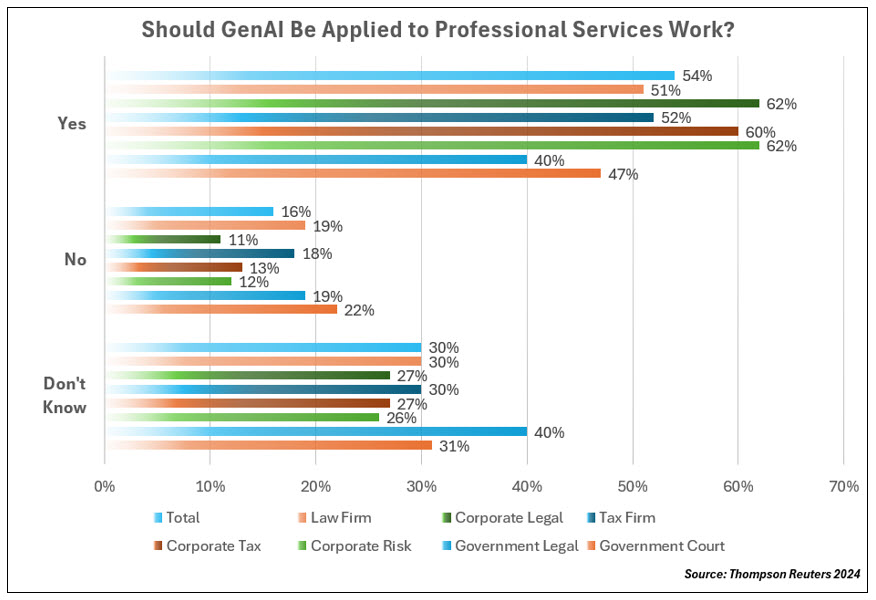
Generative AI (GenAI) is rapidly changing industries, from finance and healthcare to marketing and entertainment. AI’s ability to streamline processes and create efficiencies is clear, and its potential in the legal industry is becoming increasingly evident. For an industry deeply rooted in tradition, GenAI in the legal industry promises transformation by automating routine tasks, enabling faster research, and improving client service. A recent survey conducted by Thomson Reuters highlights this shift, with a majority of respondents in professional services affirming the role GenAI could play. This article explores GenAI’s potential in the legal industry, examining its benefits, challenges, and the importance of third-party expertise for successful adoption.
Historical Context
Over recent years, artificial intelligence (AI) has disrupted traditional practices in numerous fields. In finance, AI algorithms enhance fraud detection, while in healthcare, AI models assist in diagnostic imaging and predictive analytics. The legal industry, while historically conservative, is increasingly recognizing AI’s transformative potential. GenAI, which can generate human-like text and interpret complex data, offers unique capabilities for law firms and corporate legal departments alike.
The legal profession has traditionally been skeptical of rapid change. However, as other industries embrace AI for efficiency and cost-saving, legal services are under pressure to innovate. Technology is primed to impact several areas of law, including document review, client communications, and predictive case outcomes.
Survey Results: Professional Services Anticipate GenAI’s Role
Thomson Reuters recently surveyed professionals across various service industries. Results show that a majority expect GenAI to play a significant role in their fields, including the legal sector (source).

Taking a closer look at the legal profession, according to survey findings, support has been consistent or growing over the past year:

This data reflects a growing openness within professional services to explore AI-driven solutions. The survey also indicates that industry leaders are not only ready to adopt GenAI but believe it could enhance service delivery, productivity, and customer satisfaction. As law firms navigate complex demands and client expectations, GenAI’s potential is coming into sharper focus.
Three Benefits of GenAI in the Legal Industry
1. Efficiency in Document Review and Management
One of the most time-consuming aspects of legal work is document review. GenAI can analyze large volumes of documents quickly and accurately, reducing manual work for lawyers. Traditional document review can take weeks or even months, depending on case complexity. With GenAI, firms can streamline this process, achieving high levels of accuracy in identifying relevant information and potential legal risks. This shift allows legal professionals to focus on more strategic tasks, such as case analysis and client advising.
Example: A law firm handling corporate mergers can use GenAI to review thousands of contract pages in record time. The AI flags potential risks and relevant clauses, enabling lawyers to work more efficiently. This is also a great example of how AI can be trained to perform better over time.
2. Enhanced Legal Research Capabilities
Legal research is foundational to the practice of law. Finding relevant case law, statutes, and legal precedents requires time and specialized knowledge. GenAI can simplify this by searching through vast legal databases, identifying relevant cases, and summarizing key findings. This reduces the need for extensive manual research and minimizes the risk of missing critical information.
Example: A litigation attorney preparing for trial can use GenAI-powered tools to find case precedents in minutes. This enhances the lawyer’s ability to construct stronger arguments and ensures they are well-prepared for court proceedings.
3. Improved Client Communication and Support
Clients increasingly expect prompt, accurate responses to their questions. GenAI can assist by handling routine inquiries, providing quick answers, and even generating reports or summaries. This doesn’t replace lawyers but supplements their efforts, ensuring clients receive timely information and support.
Example: A firm could implement a GenAI chatbot to address frequently asked client questions. This system allows clients to get immediate responses for basic information while attorneys focus on complex client needs.
Three Challenges to Overcome with GenAI Adoption
While there are many potential benefits to applying GenAI in the legal industry, there are also cautions that must be addressed as this new technology is adopted.
1. Concerns about Data Privacy and Security of GenAI in the Legal Industry
Legal practices handle sensitive information, from personal client details to confidential case information. Integrating GenAI into law firms requires stringent data protection measures to prevent unauthorized access or data leaks. Ensuring compliance with legal standards, like the GDPR or HIPAA, is critical for maintaining client trust and safeguarding sensitive data.
Example: A GenAI system may analyze client files, but without proper encryption and access controls, confidential data could be exposed. Firms need robust cybersecurity frameworks when implementing AI solutions.
2. Risk of Inaccuracy and Liability Issues
Despite GenAI’s impressive capabilities, it can still produce inaccurate or biased results. In the legal field, where precision is paramount, any error can have serious consequences. Lawyers must carefully monitor and verify AI-generated results to avoid potential liability.
Example: If a GenAI tool provides incorrect legal advice in response to a client’s question, it could lead to financial losses or reputational damage for the law firm. AI outputs should be carefully vetted before use in any formal capacity.
3. Resistance to Change within Traditional Legal Culture
The legal industry’s reliance on precedent and thorough human oversight makes it particularly resistant to technological change. Many lawyers are hesitant to rely on AI, fearing it could compromise the quality of service or make some roles redundant. Overcoming this cultural resistance is essential for GenAI adoption.
Example: Senior lawyers in a traditional law firm may distrust GenAI’s ability to review documents accurately. This skepticism can hinder adoption unless leadership actively educates and reassures staff about AI’s role as a supportive and not a replacement tool.
The Role of Third-Party Expertise in Implementing GenAI in the Legal Industry
Successfully implementing GenAI in legal services requires thoughtful planning and expertise. Working with third-party experts who understand both GenAI technology and the specific needs of the legal industry is essential. These experts can help firms select appropriate GenAI tools, ensure data security compliance, and train staff on best practices.
GenAI offers substantial opportunities for improving legal services, but its implementation requires an informed approach. An expert team, such as Axis Technical Group, can assist in creating a roadmap that aligns GenAI capabilities with the firm’s specific goals. This partnership minimizes risks and ensures a seamless transition that enhances service delivery without compromising quality.
Third-party consultants can also monitor the AI’s output, addressing potential inaccuracies and adjusting the AI model to fit the firm’s evolving needs. This approach safeguards quality and boosts confidence among legal professionals who may be wary of new AI technology.
The future of the legal industry increasingly includes GenAI, with benefits that can reshape legal processes and client engagement. While there are challenges, from data security to cultural resistance, the opportunities for GenAI in the legal industry are significant. By working with third-party experts, law firms can adopt GenAI thoughtfully and effectively, maximizing its potential while mitigating risks.
With a well-planned implementation, the GenAI legal industry transformation is poised to bring substantial advantages, improving efficiency and allowing professionals to focus on complex, high-value tasks. As GenAI continues to evolve, its role in the legal industry will likely expand, ushering in a new era of innovation and improved client service.
